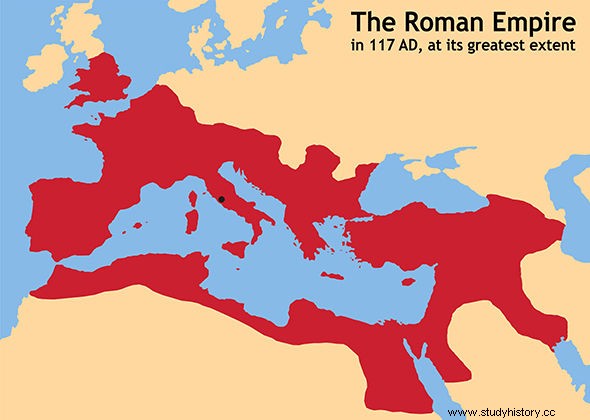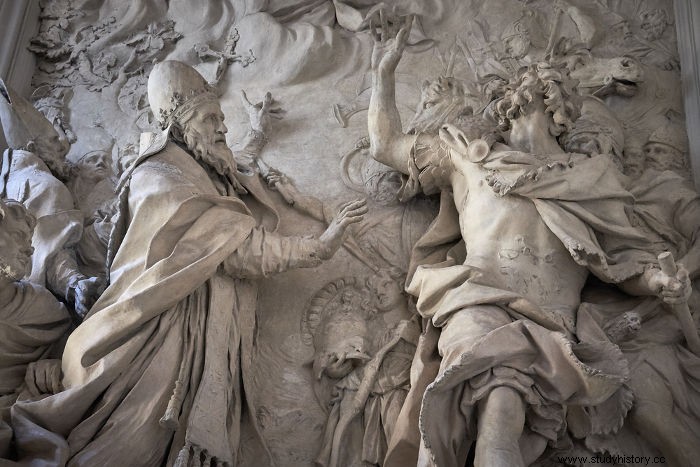
The break-up of the Roman Empire was the process that resulted in the end of the Western Roman Empire. The territories until then controlled by Rome were occupied by the Germanic peoples , who settled and created short-lived kingdoms. The Eastern Roman Empire continued to exist under the name of Byzantine Empire.
Decline of the Roman Empire

Sculpture showing Pope Leo I and Attila during the invasion of the Huns *
The decline of the Roman Empire began in the 2nd century AD. A strong crisis economic affected the entire Roman Empire. The crisis of the slave system and the attack of the Germanic peoples directly affected the production and prosperity of the Empire.
The Roman slave system was dependent on obtaining prisoners of war, however, from the 2nd century onwards, Roman territorial expansion came to an end, which interrupted the flow of obtaining new prisoners. slaves. This directly affected the production of the Roman economy, which used slaves.
Also, for centuries, the Roman Empire needed to use its military force to keep its borders under control and prevent invasions by the Germanic peoples. However, as the instability of the Roman Empire grew, the action of the Germanic peoples was getting out of the control of Rome. Thus, alamanni , francs and other Germanic peoples invaded Gaul, Spain and other parts of the Empire starting in 276.
The Germanic peoples were called barbarians by the Romans for not having the same culture as the Latins and for not speaking Latin. The term therefore carries a weight of prejudice of the Romans against the Germans.
From the 5th century onwards, the Roman Empire no longer had control over the Germanic invasions:from 409 to 429, Italy, Spain and Gaul were invaded by countless peoples; Rome was sacked by the Visigoths in 410 and by the vandals in 455. The Vandals later migrated to the Iberian Peninsula and then to North Africa. Alans and Suebi also attacked the Iberian Peninsula, and Anglos , junos and Saxons attacked Brittany. The great highlight of the invasions was the Huns , led by Attila. They came from Asia, in what is now Mongolia, and caused panic among both the Romans and other Germanic peoples, who often fled from the Huns|1| .
Formation of the Germanic Kingdoms
The realms Germans were formed from the collapse of the Roman Empire, which, unable to maintain control over its lands, suffered numerous invasions. The last Roman Emperor was deposed in 476 by the Heruli and, from then on, the possessions of the Roman Empire in Western Europe were gradually occupied by the Germanic peoples. Thus, the occupation of Western Europe happened as follows:
-
Francs :led by Clovis, they settled in Gaul and formed one of the largest Germanic kingdoms;
-
Burgundians :settled in southern France, but were absorbed by the Franks in the 6th century;
-
Ostrogoths :led by Teodorico, settled in Northern Italy;
-
Anglo-Saxons :settled in Brittany (now United Kingdom);
-
Suevos :settled west of the Iberian Peninsula, but were absorbed by the Visigoths later;
-
Visigoths :settled in the Iberian Peninsula, but were prevented by the Franks from expanding into Gaul;
-
Vandals :settled in North Africa, but were absorbed later with the expansion of Islam from the 7th century onwards.
The establishment of the Germans resulted in the formation of medieval Europe, where there was a fusion of the Latin culture of the Romans with the culture of the Germanic peoples. The process of decay of the Roman Empire and the establishment of the Germans resulted in a population decline, mainly due to the violence of the process and ruralization. As the kingdoms were structured, Christianity was consolidated and spread among the Germans.
|1| LE GOFF, Jacques. The Civilization of the Medieval West. Petrópolis:Vozes, 2016, p.26-27.
*Image Credits:futureGalore and Shutterstock
by Daniel Neves
Graduate in History
